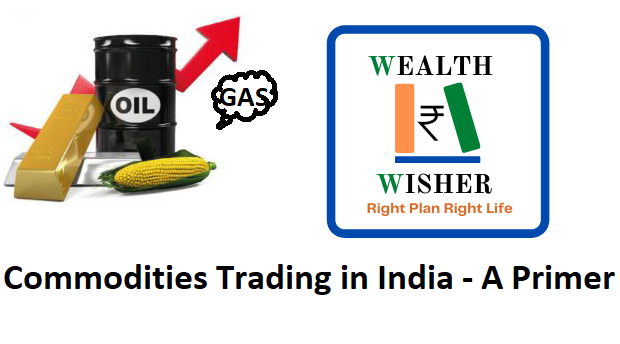A few days ago, SEBI allowed Silver Funds to be launched by Indian MF companies. Mutual Funds already were dealing in Gold MFs & a few others commodities. So how come Commodities be like assets and investible? Where is the market for commodities & how the performance is tracked? Let’s check the Commodities Trading in India today.
What are Commodities?
Commodities are the raw materials we use for various purposes.
We have been exploiting the Earth’s natural resources since evolution. We use agro products to feed, metals & allows for construction, to build weapons, tools, and energy to sustain ourselves.
These – energy, metals, and agricultural products-are the three classes of commodities that are traded on the Indian Commodities Exchanges and they are the essential building blocks of the global economy.
Why Commodities trading?
Hedge against Inflation: Rising commodity prices increase production costs. Which in turn lead to increasing prices? This link ensures that ownership of commodities is fundamentally a hedge against inflation.

At a time of uncertainty Gold shines brighter: In gold, we have a commodity that has been regarded as a currency in its own right for a long time. Gold has justified its status as a “Safe Haven Metal” during the 2008 fall. Gold has helped to preserve the wealth of a lot of investors through the turmoil of last year and its value has enhanced during this period.
Developing a nation’s growth story:
Commodity prices have been driven higher by many factors, including increased demand from China, India, and other emerging countries that need oil, steel, and other commodities to support the manufacturing and development of infrastructure.
Rising population: The rapidly increasing population is going to add lots of pressure on agro commodities as acreage (crop yield) has been decreasing or been stagnant as most of the agro-commoditized whereas demand is going up gradually.
Diversification of Investment: Investors have been investing in equities, money markets, bond markets, and the currency market. Commoditized are “real assets”, unlike stocks and bonds, which are “financial assets.
Commodities, therefore, tend to react to changing economic fundamentals in ways that are different from traditional financial assets. Also, since the last few years commodities are looked upon as good diversification of investment.
Historically a little correlation to shown against traditional asset classes such as stocks and bonds and thus can, over the long term, provide portfolio diversification benefits.
Geopolitical Tension: Geopolitical tension tends to move up prices of commodities. Unlike equities. Geopolitical tension may spark a rally in crude oil. Gold, grains, and other agro commodities.
Inverse relationship with dollar: In normal times commodities tend to have an inverse relationship with the U.S dollar for example if the dollar devalues by 10% price of commodities shall move up. Commodities have economic value in their own right. The weaker dollar was one of the factors the resulted in a Bull Run in commodities during 2008.
Hedging: Indian commodities exchange provides an excellent opportunity to many communities like farmers. Miners, refiners, and jewelers by hedging their crop or raw material on the commodities exchange.
Commodities Trading in India
In India, commodity exchange is a regulated market where the trading of commodities takes place.
Traders may choose not to take physical delivery of commodities and instead deal in Futures contracts only. These are the national commodity exchanges in India:
- Multi Commodity Exchange of India Ltd (MCX)
- National Commodity and Derivative Exchange (NCDEX)
- Indian Commodity Exchange (ICEX)
- National Stock Exchange (NSE)
- Bombay Stock Exchange (BSE)
You may open an account (just like equity trading) with any of the institutions acting as a broker. If you already have a Trading & DEMAT for equity, you need to approach your broker and ask him to activate the commodities module also.
Then you can self-trade or use the dealer-assisted facility and start investing in commodities.
Here is the process of commodities trading in India:
- The trader funds his margin amount with the broker.
- He places the order.
- The buyers and sellers are matched on the exchange platform electronically.
- The exchange determines a ‘settlement price’ for each commodity when the market closes. Depending on how the price has moved, the difference is credited to or debited from the trader’s account.
- The trader pays the margin shortfall (if any).
- The trader closes his position before the contract expires. He may also choose to opt for the delivery option that requires a separate documentation process.
Timings of the Commodity Markets
These are different from Equity markets. The most common timings are:
MCX
Monday to Friday: 9:00 am to 11:30 pm (up to 11:55 pm on account of daylight savings typically between every November and March of the following year)
Agri-commodities are available for futures trading up to 5:00 pm
Other commodities such as Bullions, Metals, and Energy products are available up to 11:30 pm / 11:55 pm
International referenceable Agri-commodities are available up to 9:00 pm as notified by SEBI
NCDEX Platform
From Monday to Friday 9:00 am to 9:00 pm
Crude Palm Oil, Cotton, Kapas (cotton flowers), Soy Oil, and Sugar: 9:00 am to 9:00 pm.
All Other Agri Commodities: 9:00 am to 5:00 pm
Hope you got this primer on Commodities Trading in India. Do let us know what you think through the comments section below or via email.








